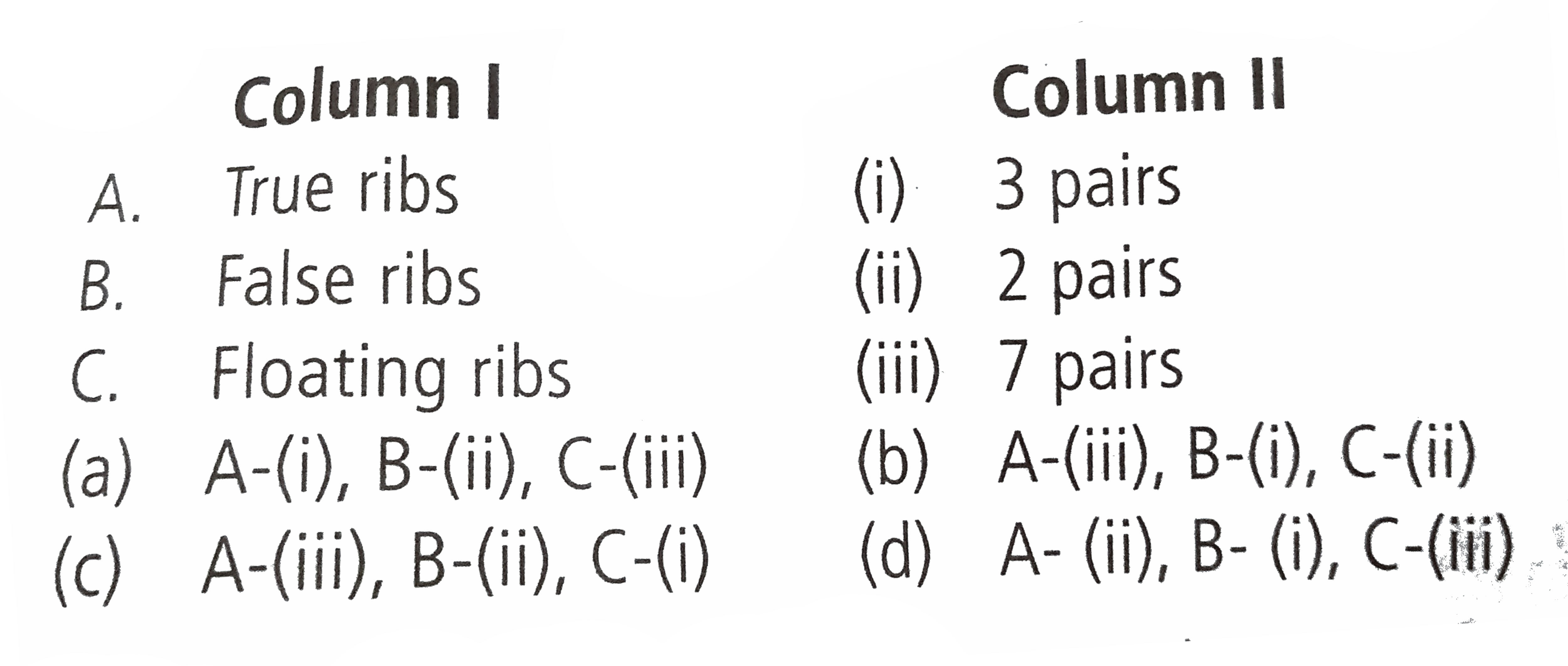Match column I with column II and select the correct option from the given codes.
Column IColumn IISaltation(i)DarwinFormation of life was preceded by chemical evolution(ii)Louis PasteurReproductive fitness(iii)de VriesReproductive fitness pre-existing life(iv)Oparin and Haldane
iii,iv,i,ii
iv,iii,ii,i
ii,iii,i,iv
i,iv,iii,ii
The correct Answer is:A
To solve the matching question, we will analyze each term in Column I and match it with the appropriate term in Column II based on the contributions of various scientists to the field of evolution.
1. Saltation:
- Definition: Saltation refers to a sudden change or large mutation that occurs at the genetic level.
- Scientist: This concept is primarily associated with Hugo de Vries, who proposed that evolution occurs through these large mutations rather than gradual changes.
- Match: Saltation → (iii) de Vries
2. Formation of life was preceded by chemical evolution:
- Explanation: This refers to the idea that before life could emerge, a variety of organic molecules must have formed from inorganic substances.
- Scientists: This theory was proposed by Oparin and Haldane, who suggested that these biomolecules formed on the primitive Earth.
- Match: Formation of life was preceded by chemical evolution → (iv) Oparin and Haldane
3. Reproductive fitness:
- Definition: Reproductive fitness refers to the ability of an organism to survive and reproduce in its environment.
- Scientist: This concept is a key part of Charles Darwin's theory of natural selection, where organisms with higher fitness leave more offspring.
- Match: Reproductive fitness → (i) Darwin
4. Reproductive fitness pre-existing life:
- Explanation: This idea suggests that life arises from existing life, opposing the notion of spontaneous generation.
- Scientist: This was demonstrated by Louis Pasteur, who conducted experiments to show that life comes from pre-existing life forms.
- Match: Reproductive fitness pre-existing life → (ii) Louis Pasteur
Final Matching:
- Saltation → (iii) de Vries
- Formation of life was preceded by chemical evolution → (iv) Oparin and Haldane
- Reproductive fitness → (i) Darwin
- Reproductive fitness pre-existing life → (ii) Louis Pasteur
Correct Option:
The correct option that matches the columns is A.
- Definition: Saltation refers to a sudden change or large mutation that occurs at the genetic level.
- Scientist: This concept is primarily associated with Hugo de Vries, who proposed that evolution occurs through these large mutations rather than gradual changes.
- Match: Saltation → (iii) de Vries
- Explanation: This refers to the idea that before life could emerge, a variety of organic molecules must have formed from inorganic substances.
- Scientists: This theory was proposed by Oparin and Haldane, who suggested that these biomolecules formed on the primitive Earth.
- Match: Formation of life was preceded by chemical evolution → (iv) Oparin and Haldane
- Definition: Reproductive fitness refers to the ability of an organism to survive and reproduce in its environment.
- Scientist: This concept is a key part of Charles Darwin's theory of natural selection, where organisms with higher fitness leave more offspring.
- Match: Reproductive fitness → (i) Darwin
- Explanation: This idea suggests that life arises from existing life, opposing the notion of spontaneous generation.
- Scientist: This was demonstrated by Louis Pasteur, who conducted experiments to show that life comes from pre-existing life forms.
- Match: Reproductive fitness pre-existing life → (ii) Louis Pasteur
- Saltation → (iii) de Vries
- Formation of life was preceded by chemical evolution → (iv) Oparin and Haldane
- Reproductive fitness → (i) Darwin
- Reproductive fitness pre-existing life → (ii) Louis Pasteur
The correct option that matches the columns is A.
Topper's Solved these Questions
Similar Questions
Knowledge Check
- Question 1 - Select One
Match column I with II column II and select the correct option from the given codes .
 AA-(ii), B-(iii), C-(iv), D-(i)BA-(iii), B-(ii), C-(i), D-(iv)CA-(iii), B-(ii), C-(iv), D-(i)DA-(i), B-(ii), C-(iii), D-(iv)
AA-(ii), B-(iii), C-(iv), D-(i)BA-(iii), B-(ii), C-(i), D-(iv)CA-(iii), B-(ii), C-(iv), D-(i)DA-(i), B-(ii), C-(iii), D-(iv) - Question 2 - Select One
Match column I with column II and select the correct option from the codes given below.
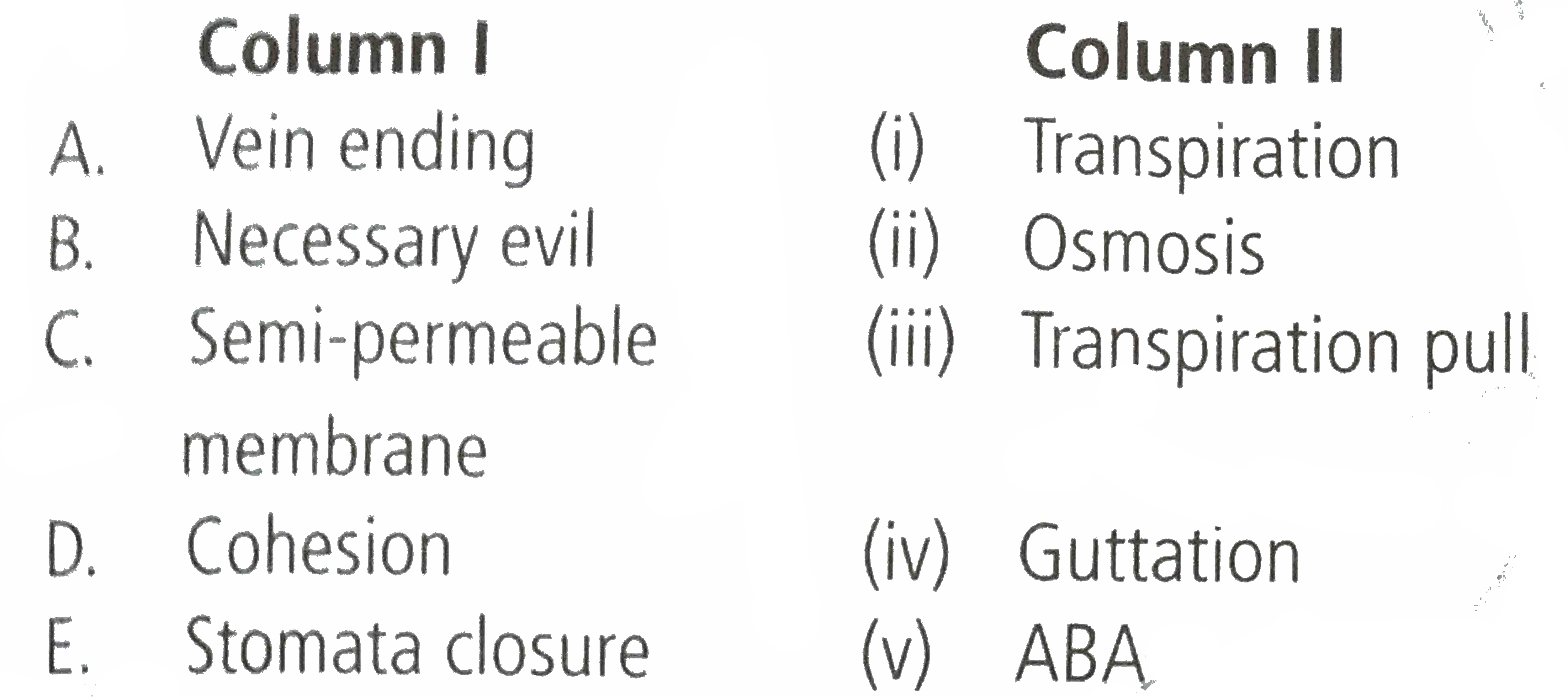 A(i)-D, (ii)-C, (iii)-A, (iv)-BB(i)-A, (ii)-B, (iii)-C, (iv)-DC(i)-D, (ii)-B, (iii)-A, (iv)-CD(i)-A, (ii)-C, (iii)-D, (iv)-B
A(i)-D, (ii)-C, (iii)-A, (iv)-BB(i)-A, (ii)-B, (iii)-C, (iv)-DC(i)-D, (ii)-B, (iii)-A, (iv)-CD(i)-A, (ii)-C, (iii)-D, (iv)-B - Question 3 - Select One
Match columnI with column II and select the correct option from the codes given below.
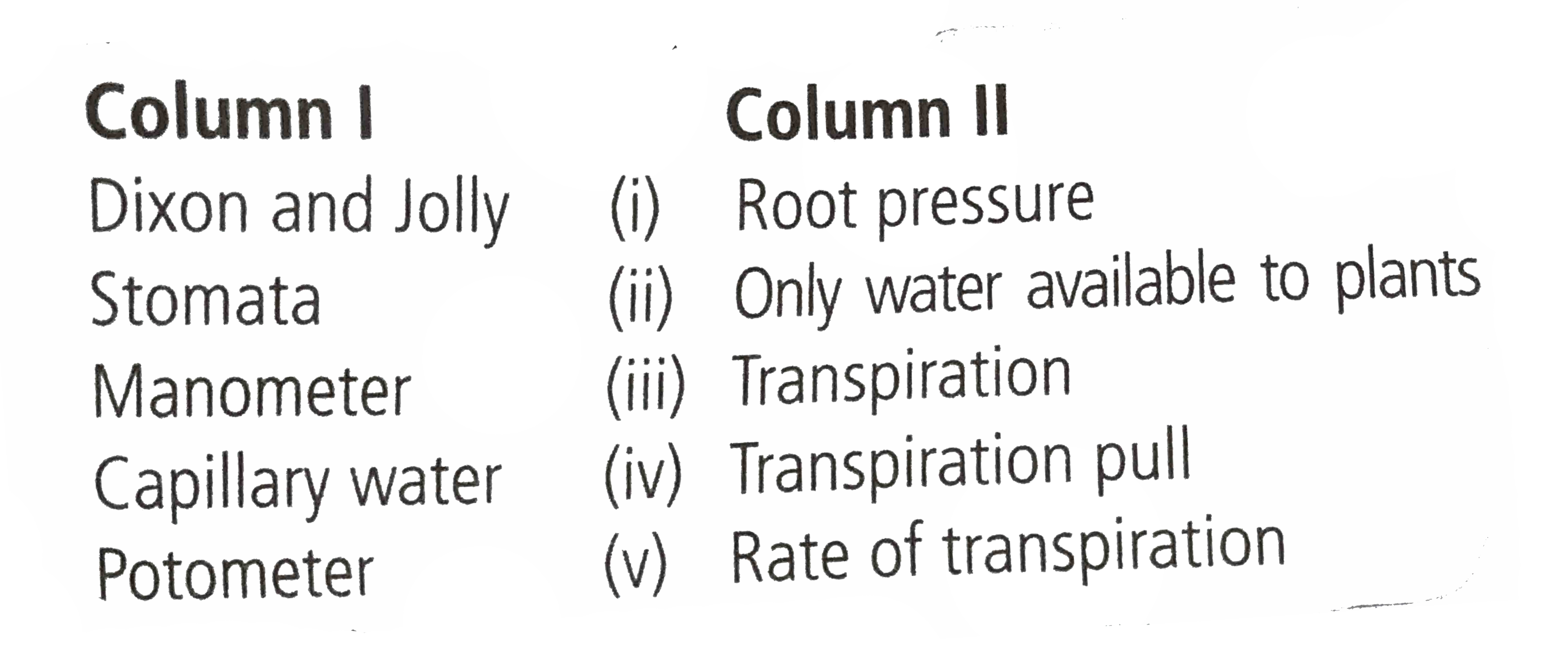 AA−(iv),B−(iii),C−(v),D−(ii),E−(i)BA−(i),B−(iii),C−(iv),D−(ii),E−(v)CA−(iv),B−(iii),C−(i),D−(ii),E−(v)DA−(v),B−(iv),C−(iii),D−(ii),E−(i)
AA−(iv),B−(iii),C−(v),D−(ii),E−(i)BA−(i),B−(iii),C−(iv),D−(ii),E−(v)CA−(iv),B−(iii),C−(i),D−(ii),E−(v)DA−(v),B−(iv),C−(iii),D−(ii),E−(i)
Match column I with column II and select the correct option from the codes given below.
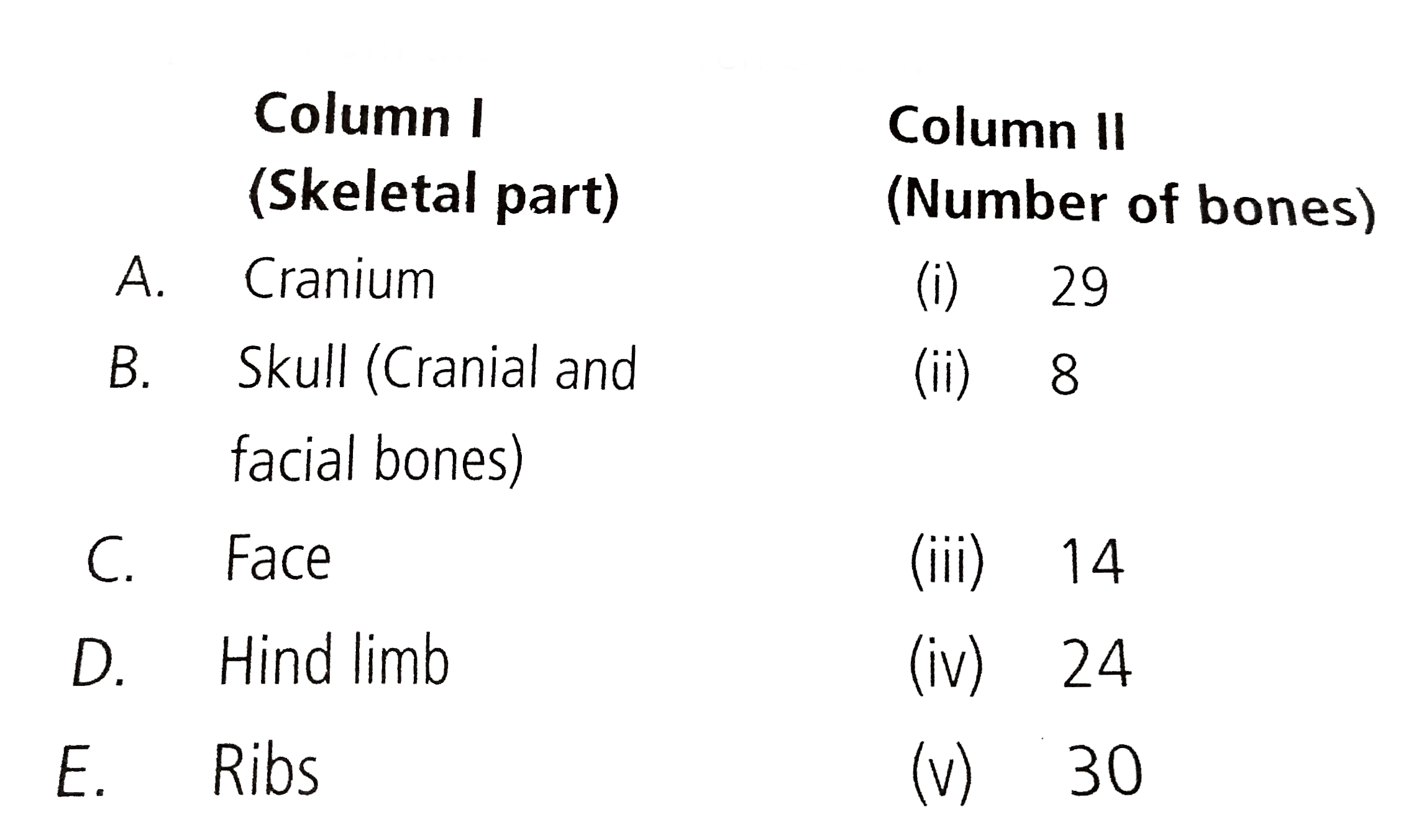 View Solution
View SolutionMatch column I with column II and select the correct option from the codes given below.
 View Solution
View SolutionMathc column I with column II and select the correct option from the given codes.
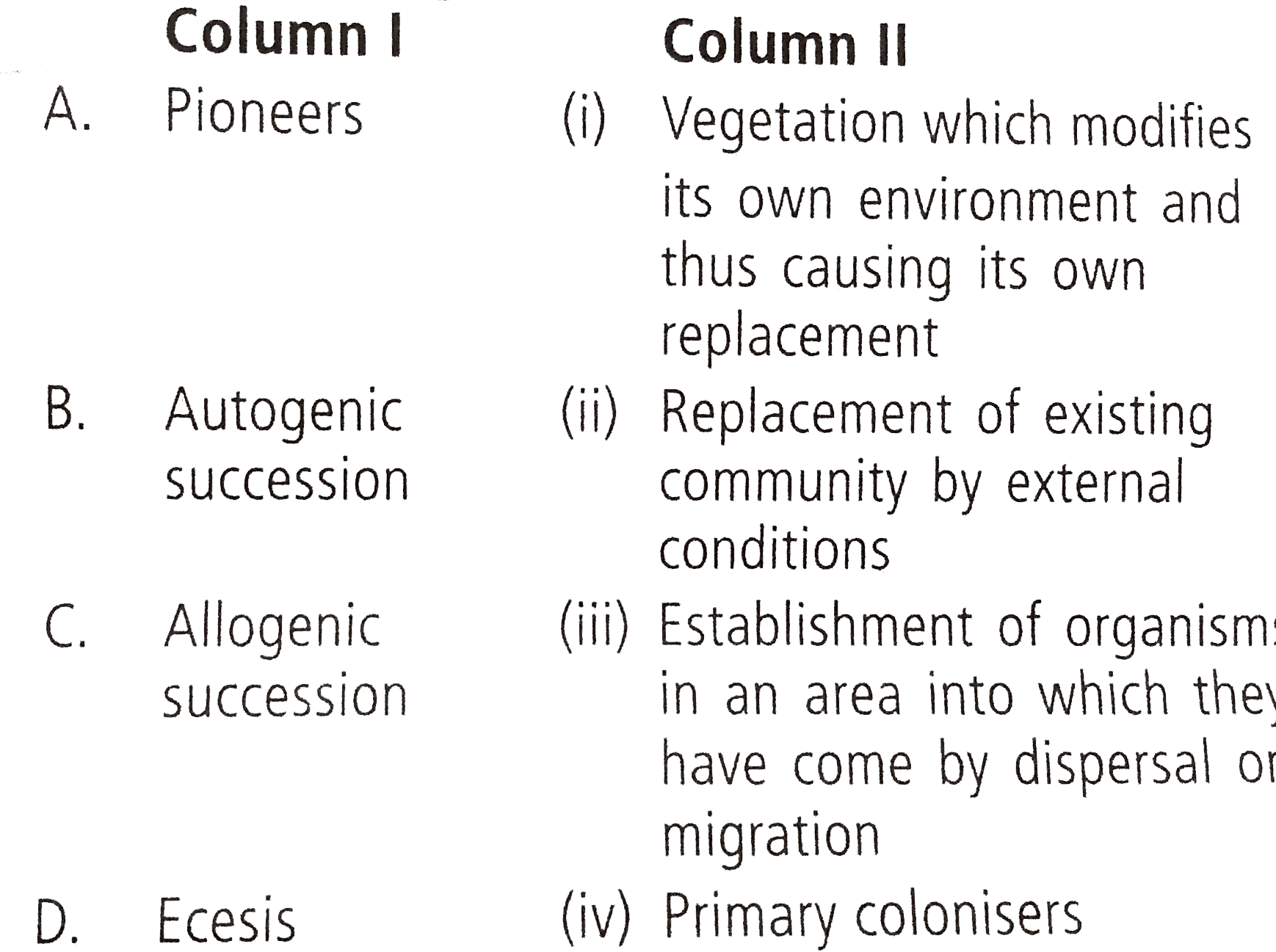 View Solution
View SolutionMathc column I with column II and select the correct option from the given codes.
 View Solution
View SolutionMatch column I and II and select the correct option from the given codes.
 View Solution
View Solution


